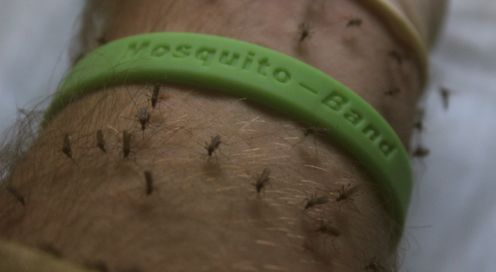
Mosquito repellent lotions, sprays and creams are a sure-fire and safe way to prevent mosquito bites – if you choose wisely and apply liberally.
Topical insect repellents that contain DEET or picaridin provide the best protection. Formulations that contain plant-based ingredients (such as tea tree oil) will provide some protection but you’ll generally need to apply these formulations far more frequently.
Regardless of a repellent’s ingredients, putting a dab “here and there” is ineffective. You need full coverage. Any gaps will give the green light to blood-thirsty mozzies to attack.
Smearing sticky, smelly repellent is often the last thing you want to do on hot and humid evenings. So entrepreneurs have started manufacturing wrist bands, bracelets and patches that purport to repel mosquitoes without the mess.
But don’t ditch the repellents just yet. While slipping on a wrist band or sticking on a patch may be an attractive alternative, when tested, they’re typically shown to be the least effective of the commercially available repellents.
What repels mozzies?
When mosquitoes are searching for a blood meal, they’ll home in on the carbon dioxide we exhale and then respond to the smelly cocktail of chemicals and microbes on our skin. That’s why some people are bitten by mosquitoes more than others.
When there’s insect repellent on your skin, the mosquitoes are either repelled by the unpleasantness of the odours or they’re confused and lose their appetite for blood.
A small number of wrist bands, bracelets and patches are registered in Australia as mosquito repellents. These are infused with botanical products such as citronella or peppermint oil. The vapour released purportedly keeps mosquitoes away.
Wrist bands containing botanical products provide very little protection. While topical formulations containing plant extracts may repel some mosquitoes, the vapours released from these wrist bands just aren’t strong enough to block mosquito bites.
One detailed study using wrist bands infused with botanical extracts found there was a reduction in biting mosquitoes, but only for a few centimetres either side of the band. Wearing a wrist band won’t provide “whole body” protection.
Laboratory studies have shown that wrist bands impregnated with DEET provide some protection against mosquitoes. But a key selling point of wrist bands and patches containing botanical extracts is that they’re an alternative to DEET. They’re primarily marketed to those looking for a “natural” alternative.
Patches containing vitamin B1 offer no protection.
What about mosquito repellent clothing?
An ever-increasing range of “mosquito repellent” clothing is available in camping, adventure and fishing stores. These items are typically made from material pre-treated with insecticides such as permethrin.
Insecticides are commonly applied to bed nets and they’ve proven effective in reducing malaria prevalence in some regions.
There is growing evidence that these products can provide some protection from biting insects.
The problem is, they may stop a mosquito biting through your shirt but they’re unlikely to stop mosquitoes biting exposed areas of skin.
After washing, any protection offered by these clothes is likely to fade.
The dream of ditching topical repellents hasn’t arrived
It’s a hassle applying topical repellents, especially to children. There is also often a misplaced perception that “chemical repellents” are a health risk.
Despite the evidence that wrist bands and patches provide little, if any, protection from biting mosquitoes, there is clearly demand from the public for alternatives to topical repellents.
A recent crowd-funding venture for a mosquito repellent patch raised more than US$500,000 without any scientific studies published to back up their claims.
Many are in love with the dream and health authorities need to address this in their health messages. But, for now at least, nothing works as well as topical repellents, especially those containing either DEET or picaridin, in beating the bite of mosquitoes.
Cameron Webb and the Department of Medical Entomology (NSW Health pathology and University of Sydney) have been engaged by a wide range of insect repellent and insecticide manufacturers to provide testing of products and provide expert advice on mosquito biology.
